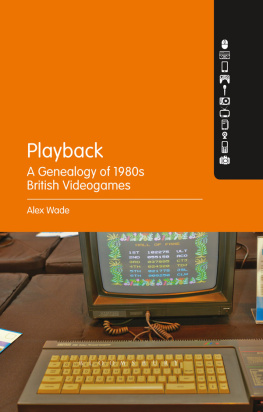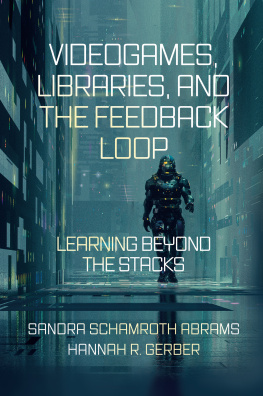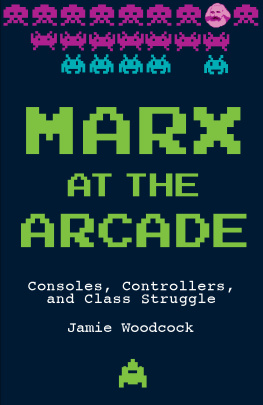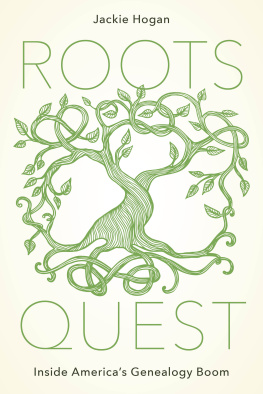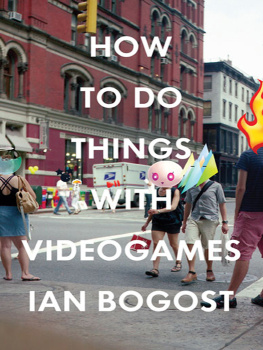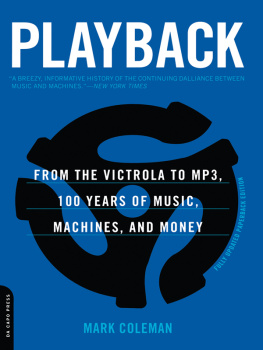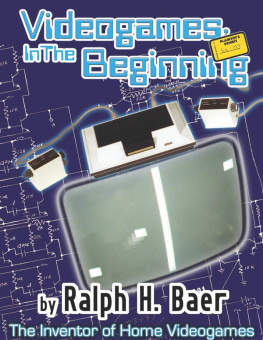Wade - Playback – A Genealogy of 1980s British Videogames
Here you can read online Wade - Playback – A Genealogy of 1980s British Videogames full text of the book (entire story) in english for free. Download pdf and epub, get meaning, cover and reviews about this ebook. year: 2016, publisher: Bloomsbury USA, genre: Romance novel. Description of the work, (preface) as well as reviews are available. Best literature library LitArk.com created for fans of good reading and offers a wide selection of genres:
Romance novel
Science fiction
Adventure
Detective
Science
History
Home and family
Prose
Art
Politics
Computer
Non-fiction
Religion
Business
Children
Humor
Choose a favorite category and find really read worthwhile books. Enjoy immersion in the world of imagination, feel the emotions of the characters or learn something new for yourself, make an fascinating discovery.
- Book:Playback – A Genealogy of 1980s British Videogames
- Author:
- Publisher:Bloomsbury USA
- Genre:
- Year:2016
- Rating:4 / 5
- Favourites:Add to favourites
- Your mark:
- 80
- 1
- 2
- 3
- 4
- 5
Playback – A Genealogy of 1980s British Videogames: summary, description and annotation
We offer to read an annotation, description, summary or preface (depends on what the author of the book "Playback – A Genealogy of 1980s British Videogames" wrote himself). If you haven't found the necessary information about the book — write in the comments, we will try to find it.
Wade: author's other books
Who wrote Playback – A Genealogy of 1980s British Videogames? Find out the surname, the name of the author of the book and a list of all author's works by series.
Playback – A Genealogy of 1980s British Videogames — read online for free the complete book (whole text) full work
Below is the text of the book, divided by pages. System saving the place of the last page read, allows you to conveniently read the book "Playback – A Genealogy of 1980s British Videogames" online for free, without having to search again every time where you left off. Put a bookmark, and you can go to the page where you finished reading at any time.
Font size:
Interval:
Bookmark:

Playback A Genealogy of 1980s British Videogames
Playback A Genealogy of 1980s British Videogames
Alex Wade
Bloomsbury Academic
An imprint of Bloomsbury Publishing Plc

For DGW
Without you there would be no games.
Contents
Writing can be a lonely process, but it is rarely achieved alone, and although it is my name on the cover, this book would not have been possible without the help and support of all here: Graham Allan, Martin Boddy, the BBC, Michelle Chen, Ann Cubbin, Carolyn Downs, Mark Featherstone, Mandy French, Mike Gane, Katie Gallof, Jon Hare, Andrew Hewson, and those who anonymously agreed to be interviewed as part of the project, Rew Hulley, Pascal Kao, Alex Kendall, Steve Kitson, Lucy Land, Mark Richards, Mary Al-Sayed, Phil Shelton, Dennis Smith, the staff of Retro Gamer, Anna Hanus-Wade, Mark Wade, Mary Wade, Stephen Wade, Annalise Weckesser, Chris White and Emma Winterman.
Thanks to the three initial anonymous reviewers of the book proposal. Their suggestions and support were invaluable for the direction and success of the project.
Thanks to the anonymous reviewer of the final manuscript for their detailed feedback on the text.
Finally, special thanks to Nick Webber for his reading and comments on the manuscript, a willing brief undertaken with a historians eye for the past and a media scholars acuity of the present.
Needless to say, any errors, omissions and oversights within the text are my fault alone.
One of the most important tasks for the social history of sport could well be to establish its own foundations by constructing the historical genealogy of the emergence of its object as a specific reality.
Pierre Bourdieu, Sociology in Question
Videogames reliance on the linear-chronology provided by their adherence to technological progression gave rise to one of the most tempting, gratifying, and coherent explanations for their growth in the final quarter of the twentieth century. The fallout of nuclear missile programmes in the US academies of the 1960s, the 1970s and the 1980s paid host to widespread public acceptance of videogames and their subsequent commercial success. As arcade games and conversions onto home consoles gained traction, swathes of social groups invested in the wonder of videogames originating from Chicago, Tokyo and Kyoto. Such was the cultural craze around videogames that it became an invasion of the space invaders par excellence. From the midways of Broadway to the piers of Venice Beach, the videogame had triumphed. The silicon of microprocessor technology was no longer used for abstract calculations, but what was now put to quotidian, practical and fun utility: to play games. Inevitably, there were moral panics and dangers associated with such a shift in financial and time expenditure. As a result, videogames and the subcultures that grew around them drew the interest of social commentators and cultural critics who dedicated themselves to the documentation of the era along with novelists, graphic artists and philosophers, such as Amis (1982), Bloom (1982) and Sudnow (1983), whose attempts were as inventive and innovative as the games themselves. Then, it was over. Well acknowledged is the crash of 1983 when the videogames industry overstretched and spectacularly imploded the bursting of the bubble signalling an end to the golden age of gaming, with its remnants symbolically entombed with the burial of thousands of Atari VCS cartridges in a New Mexico landfill (Guins, 2014).
The problem with this exposition of videogame history is that it is only temporally correct and, even then, only within the strict linear-chronology demanded by technological progression and development. This popular narrative, immortalized in the ruminations of the Twin Galaxies of Walter Day (1998) and replicated in many popular and academic studies since (e.g. Kent, 2001) is at once spatially out of joint and not accepting of the subtleties and niceties of the emergence of a new field. The particular bias towards an account that focuses almost exclusively on the US experience of videogames originating in North America and Japan means that other histories of gaming are elided from view and inquisition. The recent edited collection Before the Crash (Wolf, 2012) is symptomatic of this. While the analysis is always insightful and provides much-needed context for a wider consideration of the industry, the fact that it is temporally located before the crash means that it is spatially located in the United States. Yet, at the very point where the US industry was in turmoil, Europes videogame industry was gathering pace and providing opportunities for coders in Sweden, Denmark, Germany and Central and Eastern Europe. The United Kingdom was central to this alternative history, with its influence stretching beyond the Iron Curtain into Poland and Czechoslovakia, spanning the Pacific, and reaching as far as Australia and New Zealand. Such was the geographical and cultural position of the Antipodean islands that they were exposed to the United Kingdoms popular software practices, such as modding and bedroom coding, but they were also availed to idiosyncratic hardware from Asia, such as the SG-3000, the only home computer to be developed by Sega.
It is not true to say that these are histories that have been abridged from the literature, but rather that they are lying dormant, occasionally shaken from their slumber by investigators working at the geographical margins and cultural peripheries of games studies. Yet this does not need to be the case. As Raiford Guins notes, ignoring early writing around videogames due to their intended audience, approach, verbosity, or writing style has stymied work towards critical historical studies of video games, namely by ignoring early publications (Guins, 2012: 24). Indeed, there is much to recommend and subject to analysis. Alongside the writing of the golden age from Martin Amis and others, Leslie Haddon contributed a range of academic articles investigating home computers and games during the 1980s, while there have been significant contributions to the moral panics, arcade subcultures and politics of videogames from social scientists, cultural commentators and politicians. Writing on the formation of videogame antecedents such as pinball, amusement arcades and gambling is seen to be extremely relevant when a linear-chronological approach is replaced by genealogy. Meanwhile, contemporary authors such as Patryk Wasiak and Jaro Svelch are exploring the importance of Eastern Europe, particularly given the legal position of pirated software, cracking and counterfeit computers, while Melanie Swalwells work continues to concentrate on the unique position of Australia and New Zealand, and Alison Gazzards forthcoming book on the BBC Micro taps into the fears and opportunities of a changing British industrial society in the 1970s and 1980s. With these ideas at the fore, while being mindful of much of the excellent game history work originating in the United States, one of the central aims of this book is to subject the national and international literature both of the time and about the time to sustained critical analysis. The purpose of this is twofold. First, it provides a frame for the theoretical position of the book around the genealogy of the UK videogames industry. Second, and directly related to this, is the context provided by the literature for empirical research on bedroom cultures, the spaces of arcades, the commercial/cultural formation of the 1980s videogames industry and the political position of videogames.
Font size:
Interval:
Bookmark:
Similar books «Playback – A Genealogy of 1980s British Videogames»
Look at similar books to Playback – A Genealogy of 1980s British Videogames. We have selected literature similar in name and meaning in the hope of providing readers with more options to find new, interesting, not yet read works.
Discussion, reviews of the book Playback – A Genealogy of 1980s British Videogames and just readers' own opinions. Leave your comments, write what you think about the work, its meaning or the main characters. Specify what exactly you liked and what you didn't like, and why you think so.

